Related Content
Content
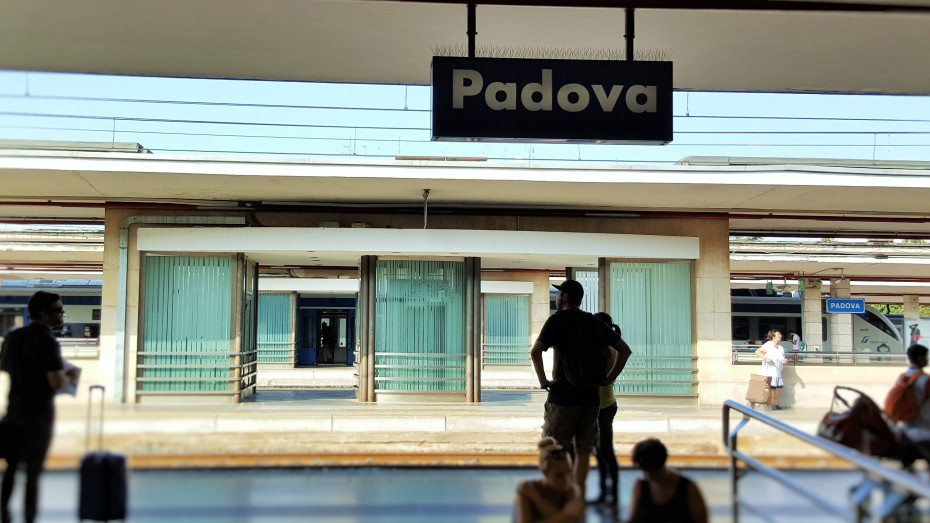
Using Rail Passes in and to/from Italy
All that's good to know about using Eurail and InterRail passes on Italian train journeys and on international trains to and from Italy
Share
There are multiple types of rail pass which can make it easier and cheaper to explore Italy by train.
- the relatively new Trenitalia Pass
- Italia in Tour Passes
- Eurail and Interrail Passes; both solely for travel in Italy, and 'Global Passes' - which enable Italy to be combined with rail travel in other countries.
Among other nuggets of info, the full guide below explains the differences between the Trenitalia Pass and the Eurail / Interrail passes and explains in depth how seat reservations do and don't apply when using the passes.
Using the new Trenitalia Pass
The Italian national rail operator is now offering a relatively new type of national rail pass, the Trenitalia Pass which can be used by visitors to Italy.
It can be used for journeys on the its express trains, the Frecce services, the Intercity trains, the overnight Inter City Notte trains and the Italian/Swiss EC trains for journeys wholly within Italy; Milano <> Como and Stresa.
These trains all have mandatory reservations, but when Trenitalia Pass users book journeys, the reservation is included and seats are assigned as when booking tickets.
Once the pass has been activated these journeys can be booked on the Trenitalia website/app, at ticket desks in Italian stations, or from ticket machines.
A maximum number of bookings is associated with each type of pass = 3, 4, 7 or 10 journeys
When a journey involves a connection it is classified as one booking.
So the Trenitalia Pass is not a hop on and off rail pass, it can only be used on the respective max number of pre-booked journeys.
The types of Trenitalia Pass
There are four different types of pass in terms of duration:
- 3 journeys within 7 consecutive days
- 4 journeys within 7 consecutive days
- 7 journeys within 15 consecutive days
- 10 journeys within 30 consecutive days.
There are three age ranges - Youth and Senior Passes are cheaper than Adult Passes:
- Senior = passengers over 60 years old on the date of purchase.
- Youth = on the date of purchase the user must be aged 12 to 27 - note that you can reach the age of 28 between buying the pass and travelling and the pass will still be valid.
- Adult = on the date of purchase the user must be aged 28 to 59.
A maximum of 2 children (children aged 4-11 the date of purchase) can be added to each Adult Trenitalia Pass free of charge, note that a child can reach the age of 12 between buying the pass and travelling and they won't need a Youth Pass.
There are also three travel classes:
- Easy = can be used to travel in Standard Class on the Frecce and Intercity trains, 2nd class on the EC trains in Italy (Milano <> Como and Stresa) and in the seats and couchettes on the Intercity Notte night trains.
- Comfort = can be used to travel in Business or Premium Class on the Frecce trains, in First Class on the Intercity and EC trains; and in the couchettes and two/three bed sleeping cabins on the Intercity Notte trains
- Executive = can be used to travel in Executive*, Business or Premium Class on the Frecce trains, in First Class on the Intercity and EC trains; and in the couchettes and two/three bed sleeping cabins and Excelesior (superior) 1 and 2 bed sleeping cabins on the Intercity Notte trains.
*= Executive Class is only available on the Frecciarossa 500 and Frecciarossa 1000 trains.
Hence a total of 36 different passes / prices, which are listed in the 'Fares' section on Trenitalia's pass guide.
Differences between Trenitalia Pass and Eurail / InterRail passes
- Users of Eurail and Interrail passes can hop on and off the Regionale and Regionale Veloce trains, but Trenitalia Passes aren't valid on these trains.
- During the period of time that they are valid for, the number of journeys isn't capped on Eurail and Interrail Passes.
- Eurail Passes for Italy and Interrail Passes for Italy have different periods of validity including options which allow for 6 and 8 days of travel, but Trenitalia Passes can allow for 7 or 10 days of travel.
- The mandatory seat reservations on the day trains (EC, IC and Frecce), are an additional cost when using Eurail and Interrail Passes, but not when using Trenitalia Passes.
- The Trenitalia Passes also includes the reservation fees of different types of sleeping accommodation on the Intercity Notte trains, according to the type of pass.
However, Eurail and Interrail passes don't include these comparatively expensive reservation costs, more than €40 for a couchette berth and more than €45 for a bed in a sleeping cabin.
The bespoke travel planning service can work out whether a Trenitalia Pass, or a Eurail Pass or an Interrail Pass for Italy will be the best value for money on an itinerary.
Though something to keep in mind is that the the Regionale and Regionale Veloce trains, on which Trenitalia Passes can't be used, are the most frequent train services on these routes:
- Bolzano - Trento - Bologna - Verona
- Firenze - Perugia - Assisi - Foligno
- Firenze - Arrezo - Chiusi - Orvieto - Roma
- Firenze - Pisa - La Spezia or Livorno
- Roma - Foligno - Ancona
- Milano - Ancona - Stresa - Domodossola
- Milano ↔ Genova
- Genova - Albenga - San Remo - Ventimiglia (French border)
- Genova - Sestri Levante - the Cinque Terre villages - La Spezia
- Venezia ↔ Trieste
- Messina ↔ Palermo
- Messina - Taormina - Catania - Siracusa
Popular locations which are only served by Regionale (R and RV) services, include Agrigento, Colico, Lecco, Lucca, Siena and Tirano.
Using Interrail and Eurail Passes in Italy
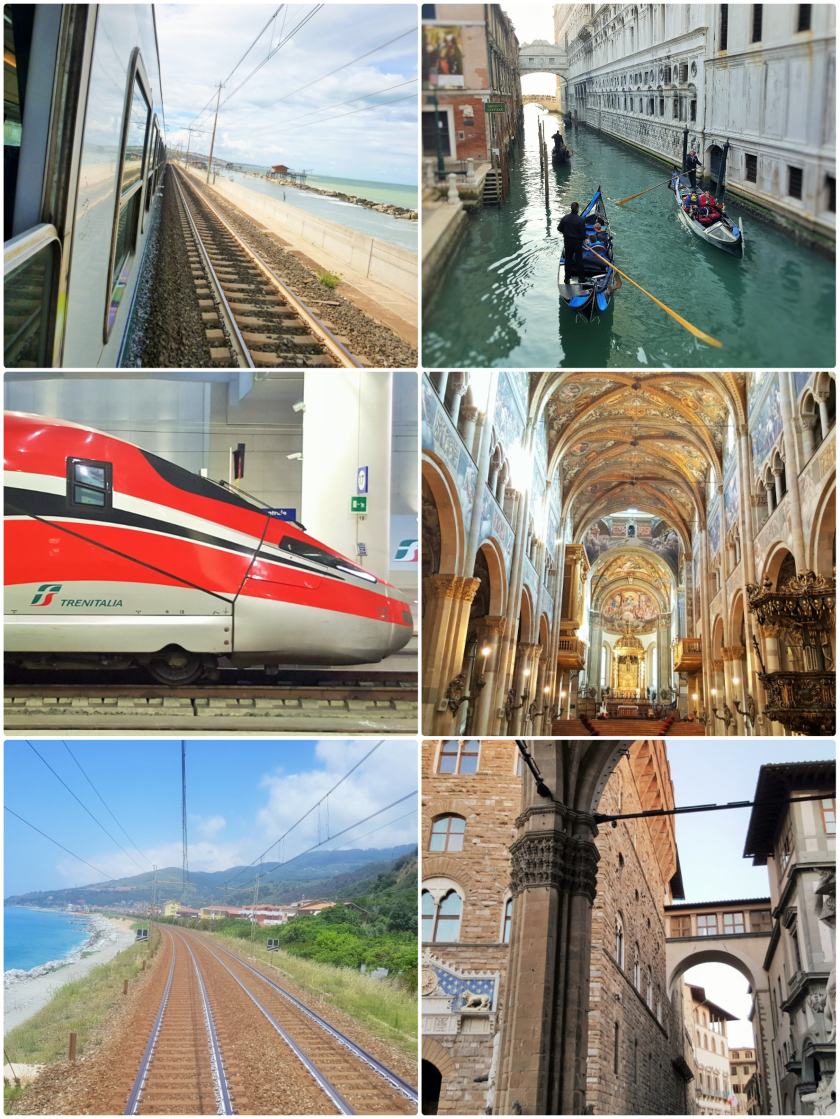
Welcome to the guide to using Interrail and Eurail Passes which are valid for train travel in Italy.
Having used rail passes to travel 1000s of kilometers around Italy by train, SMTJ anticipated the questions you are most likely to have, we hope.
So either use the content menu to jump straight to the info you need, or spend 10 mins (ish) reading all of our insights.
They should save you save you time, money and confusion!
Can I hop on any daytime train?
Not quite, rail passes aren't valid on the high speed trains operated by Italo and on a few local networks of the Regionale trains
IF you avoid the fast 'Frecce' trains you can hop any of the trains provided by the main national rail operator, Trenitalia.
The Regionale (R and RV) trains
You can hop on and off *nearly all of the Regionale (R/REG) and Regionale Veloce (RGV/RV) trains without having to bother with making reservations prior to boarding.
Because seats can't be reserved on the on these two types of Regionale services (R and RV) they can be crowded in summer and around holidays, so if you'll be joining these trains at a city station, it's worth being at the station before boarding will commence.
*= What's becoming slightly awkward is that a few Regionale train services are now operated by regional government organisations instead of the national rail operator, Trenitalia and when that is the case rail passes can not be valid.
It's particularly worth being aware of this if you will be taking local trains to/from Bari, Bolzano and Trento.
A big plus of the Regionale Veloce (RGV/RV) services in particular is that they can cover relatively long distances.
Popular routes taken by Regionale Veloce (RV) trains:
On these routes the RV train services provide an alternative to paying reservation fees on the Frecce or EC trains.
(1) Milano - Arona - Stresa - Domodossola*
(2) Milano - Como - Chiasso - Lugano - Locarno (operated by Ticino)
(4) Milano - Brescia - Desenzano del Garda - Peschiera de Garda - Verona*
(5) Venezia - Padova/Padua - Vicenza - Verona
Connect in Verona to travel Milano ↔ Venice/Venezia by Regionale Veloce trains
(6) Venezia - Padova/Padua - Rovigo - Ferrara - Bologna
(7) Bologna - Verona - Trento - Bolzano - Brennero (connect at Brennero for local trains to Innsbruck)
*routes operated by Trenord - rail passes are valid on Trenord trains.
On these routes the RV trains are more frequent than the IC trains AND also enable the Frecce services to be avoided.
(2) Milano - Piacenza - Parma - Modena - Bologna
(4) Piacenza - Parma - Modena - Bologna - Rimini
(5) Roma - Grosseto - Livorno - Pisa
(7) Roma - Ancona
(8) Roma - Arezzo - Firenze/Florence
(9) Messina - Palermo
Popular longer routes taken by slower Regionale (R/REG) trains:
(1) Genova/Genoa - Albenga - San Remo - Ventimiglia (connect for local trains towards Nice in France)
(2) Genova - Sestri Levant - Monterosso (for the Cinque Terre) - La Spezia
(3) Firenze/Florence - Pisa - La Spezia or Livorno
(4) Firenze/Florence - Siena
(5) Firenze/Florence - Arezzo - Perugia - Assisi - Foligno
(6) Roma - Napoli/Naples
(7) Milano - Tirano (connect for RhB trains into Switzerland)
Reservations when using Eurail and Interrail Passes
Which Italian trains require reservations?
The short answer is that reservations are required on all of the Frecce train services; no matter how long your journey will be; and are also now mandatory on the InterCity (IC) trains.
Reservations can typically be booked from 4 months ahead in advance of the travel date.
Booking reservations online
When booking Eurail or Interrail passes you can opt to use a mobile pass or a paper pass.
1 - Whether you opt for mobile or paper passes, you can book reservations online by using the Eurail reservation service or the Interrail reservation service but you will be charged a €2 booking fee per reservation, per person.
2 - Though these €2 booking fees can now be avoided if you use the OBB, Austrian Railways, online booking service to book the mandatory reservations on Italian day trains.
SMTJ isn't going to question the logic behind this highly useful service, particularly as the bookings can be made irrespective of whether you have a mobile or paper pass.
Though the process is very much less than obvious, hence a step-by-step booking guide for the rail pass reservations, being included on SMTJ's instructions for using the OBB website.
3 - RailEurope now sells rail pass reservations on the above trains - Though it now charges a seat reservation fee of €2 / £1.75 / $2.35 USD which applies per passenger, per route.
On my recent trip I had a last minute change of plans and booked a reservation on the next train to Venice, while I was stood on the course at Milano Centrale station.
4 - Dutch rail booking service Happyrail can also sell reservations for travel by the Frecce trains.
Rail pass reservations are no longer sold on the Trenitalia website.
OR if you happen to be travelling through Germany on route to Italy, you can book reservations with no booking fee at a Reisezentrum travel desk in a major German station, the hauptbahnhofs.
Booking the reservations at Italian stations:
If you're happy to make your reservations once you have arrived in Italy, then you can book them in stations at a ticket desk, regardless of whether you have booked the mobile or paper versions of the Eurail and Interrail passes - though apparently you will now be charged a €2 booking fee per reservation.
Note that the Trenitalia branded ticket machines no longer sell reservations to Eurail and Interrail pass users.
Change of plans
Though what's new is that 'reservations made at a station in Italy are '80% refundable prior to departure'.
Meaning that if you purchase a reservation at an Italian station but then don't want to go ahead and take that train - you can take the reservation to a travel desk prior to boarding, to have 80% of the purchase price returned to you.
Some advice on when to book these reservations:
Because it can be relatively straightforward to book reservations at the station in Italy, it can be tempting to exploit the possibilities for spontaneous travel provided by using an Interrail or Eurail pass and refrain from booking any mandatory reservations in advance.
However, booking reservations at least 4 weeks ahead is recommended if you;
- need to travel on a specific train (and not on specific route) - particularly between May and October
- want to take any Intercity train between May and October
- want to take the Intercity trains between Milano and Monterosso/La Spezia/Pisa/Livorno year round
- want to take Intercity trains between both Roma/Napoli and Sicily year round
- want to take Frecce trains between Roma/Firenze/Bologna and Verona/Bolzano
- want to take Frecce trains between Roma and any destination south of Salerno (Bari, Lecce, Villa S, Giovanni, Reggio di Calabria).
In contrast, when travelling on the routes with frequent Frecce services, such as Venice <> Milan or Rome and journeys between cities on the Turin - Milan - Bologna - Florence - Rome - Naples route - if you leave making a booking until the last minute, some trains might be sold out, but alternative convenient departures will be available.
Using rail passes on InterCity trains:
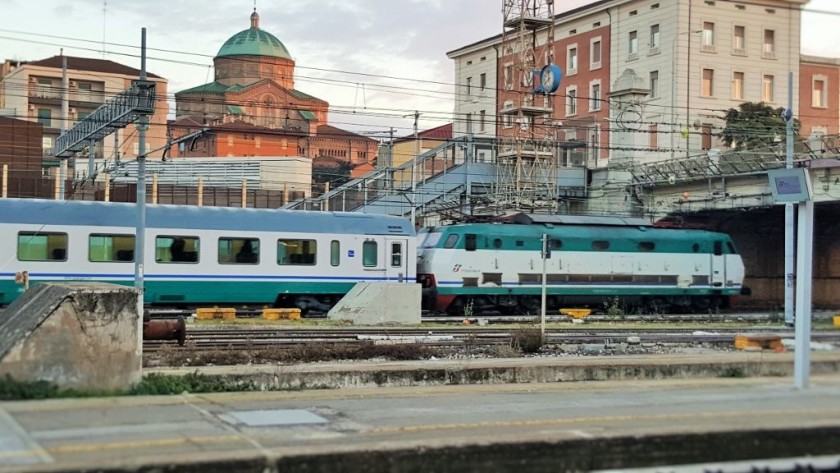
Cheapest, but slowest, of the express trains options are the InterCity express trains, but the reservation fee to travel by these trains is only €3 in 1st and 2nd class
Paying this reservation fee pre-boarding is now mandatory.
Using rail passes on the Frecce trains:
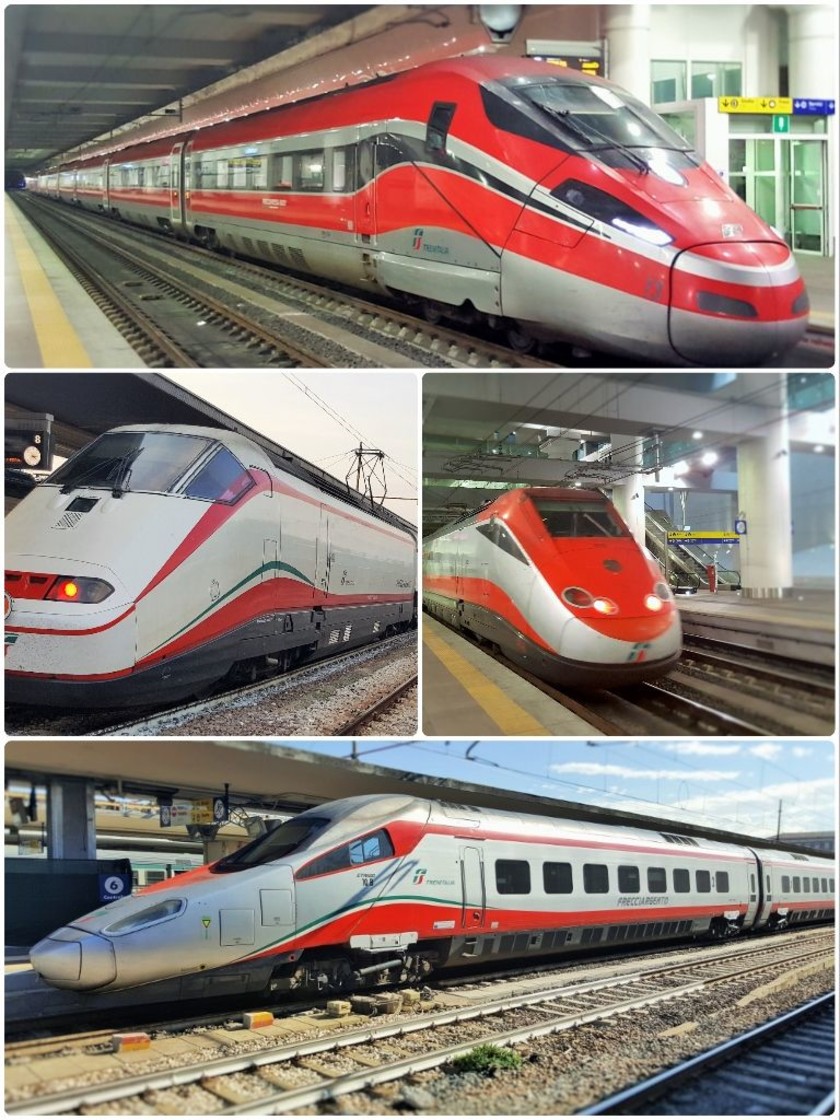
The reservation fees for the Frecce trains are €13 if you have a 1st OR 2nd class pass.
Though what's new is the info on the Interrail website and Eurail website that 'reservations made locally are 80% refundable prior to departure'.
Meaning that if you purchase a reservation at an Italian station, from a ticket machine or staffed ticket desk, and then subsequently decide not to go ahead with the journey, you can take the reservation to a travel desk and have 80% of the purchase price returned to you.
Italian ticket desks now charge a €2 booking fee for domestic rail pass reservations.
(The other prices that you may see for these reservation fees, include a booking fee, but paying that additional cost is easily avoided; see the Booking the reservations notes below).
Travel by the very fabulous Frecciarossa 1000 or Frecciarossa trains with a 1st class Eurail or Interrail pass and your reservations will be in ultra-swish Business Class.
If you want to mainly travel by the Frecce trains, a 1st class pass will be better value, in terms of the money you'll save compared to a 2nd class pass.
Because the reservation fees are a flat rate, taking a Frecce train can be good value IF you will be travelling long distances such as Milano <> Napoli; Venezia <> Roma or Torino <>Firenze.
Compared to buying tickets even a couple of days ahead, the day of rail pass use + the reservation fee, can equate to a saving of than €80 if you will be using a First Class pass and €40 if you will be using a Second Class pass.
Using rail passes for journeys WITHIN Italy on the Railjet and EuroCity trains heading to/from Austria
Instead of Italian Intercity trains, the Railjet and EuroCity trains that are heading to/from Germany and Austria operate on these two routes:
(1) Brennero - Fortezza - Bolzano - Trento <> Verona - Bologna - (Rimini)
(2) Brennero - Fortezza - Bolzano - Trento <> Verona - Vicenza - Padova - Venezia/Venice.
For any domestic journey within Italy by these trains, the rail pass reservation fees are now €13 in 1st and 2nd class - the same price as the Frecce trains, but €10 more expensive than the Intercity trains - to which these trains are directly comparable.
So avoid them and take the alternative Regionale (RV/R) trains instead.
Using rail passes for journeys WITHIN Italy on the EuroCity trains heading to/from Switzerland
On the Milano <> Stresa and Milano <> Como routes the express trains are the EuroCity trains that are heading to/from Switzerland
The rail pass reservation fees are now €13 in 1st class ans 2nd class, so avoid them and take the alternative Regionale (RV/R) trains.
Using rail passes on the night trains:
The night trains on routes within Italy are the Intercity Notte services.
Prior to arrival in Italy reservations for the Intercity Notte trains can be purchased, without payment of a booking fee, by using the
ItaliaRail reservation service.
The reservation fees on ItaliaRail are seemingly sold at these 'flat rates' irrespective of distance; and the same rates are available regardless of whether you will be travelling with a 1st class or a 2nd class pass:
- Seats = €3 (not available on most Intercity Notte routes, see above)
- A bunk in a 4 berth couchette (Cucceta Comfort) compartment = €41 per person
- A bed in a 3 berth Vaggoni Letto Deluxe cabin = €48 per person
- A bed in a 2 berth Excelsoir cabin (with shower) = €58 per person
- A bed in a 2 berth Excelsoir cabin (with shower) = €122 per person
These rates are approximately 50% of the cost of booking tickets for sole occupancy of the accommodation; which is a better deal for Eurail and Interrail pass users compared to how rail pass reservations are typically sold on night trains.
In particular two 2nd class per users can pay €56 per person to share a 'luxury' sleeping cabin with a shower; while on the international Nightjet trains from Italy, the equivalent accommodation costs more than €100 per person.
However, if you will be travelling alone or in a party which can't be divided neatly by 2, 3, or 4, the terms on ItaliaRail make it clear that you will be sharing a cabin with another rail pass user(s); though the accommodation will be segregated by male/female.
ItaliarRail doesn't seemingly offer sole occupancy reservations at all.
The price info on the Interrail/Eurail reservation services suggest that the reservation fee of sole occupancy in an Excelsoir cabin is €122, so presumably they can be booked on the reservation service.
Though once you add in the daily cost of using the pass, this fee is typically more expensive than booking tickets for sole use of an Excelsoir cabin; and it will be more expensive than booking a ticket for sole occupancy of a Vaggoni Letto Deluxe cabin.
Another thing to watch out for is that presumably because these flat rate rail pass reservation fees can be good value, they're not seemingly available on all Intercity Notte routes.
In particular on the longer north <> south routes ItaliaRail only tends to offer departures which require a connection; which therefore often requires two sets of reservation fees, despite direct trains being available.
On ItaliaRail, the Roma <> Trieste InterCity Notte service isn't seemingly available for rail pass reservations at all.
How easy is it to avoid the Frecce trains?
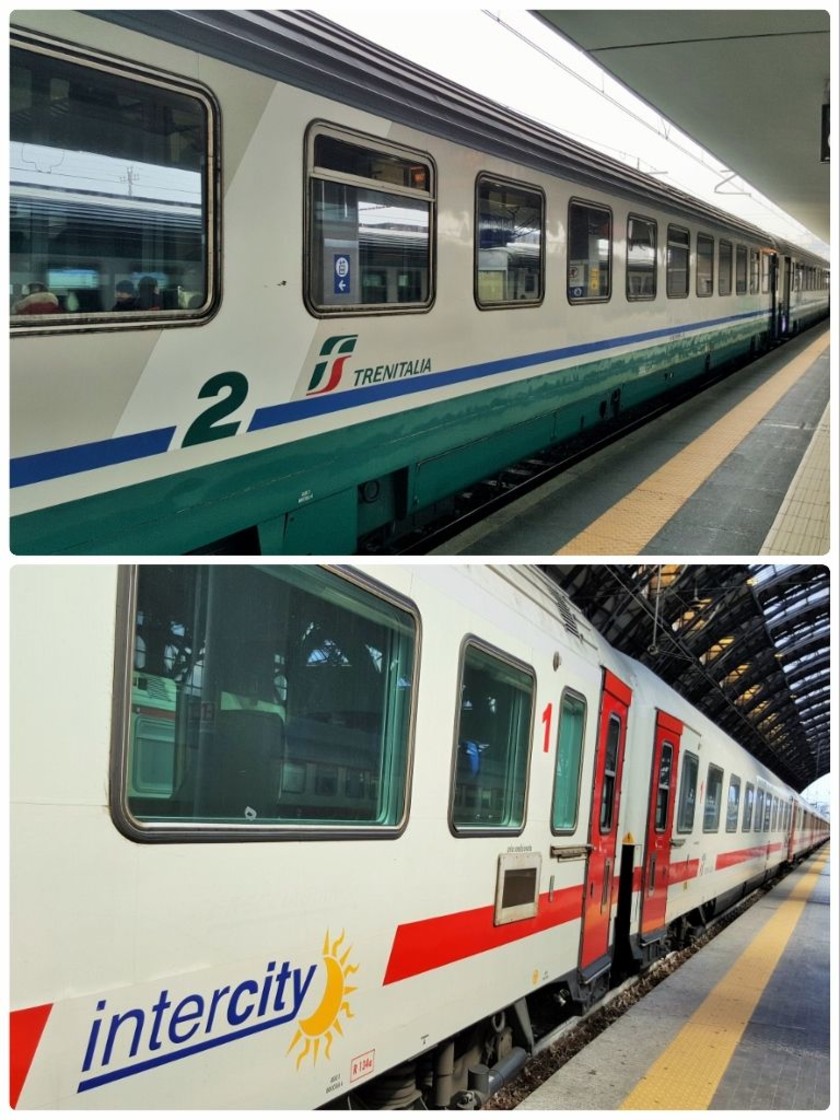
You can travel between any Italian city with a rail pass without having to pay the more expensive reservation fees to travel by Frecce trains.
On the shorter distance routes Regionale (REG) and Regionale Veloce (RGV/RV) are usually an option; see the NON-comprehensive route list above.
Over long distances InterCity trains can be a slower, option; though when they are an alternative to the Frecce trains they're generally much less frequent.
However on some routes, included the two listed below the Intercity trains are the only option:
(1) Milano - Genova - Monterosso (for the Cinque Terre) - La Spezia - Pisa - Livorno - Roma
(2) Roma - Napoli - Messina - Palermo/Siracusa
Will I save if I avoid the Frecce trains?
Something to keep in mind is that avoiding the reservation fees on the Trenitalia high speed trains can mean that using rail passes to travel around Italy by train won't offer such good value for money.
Tickets for journeys by InterCity (IC); Regionale (REG) and Regionale Veloce (RGV/RV) trains are comparatively cheap; and if you want to avoid ANY reservation fees when travelling around Italy with a rail pass, you'll have to take those train services.
A last minute ticket for a journey by RGV train between Firenze/Florence and Roma costs less than €22; and this is one of the longest possible direct journeys by Regionale Veloce (RGV) train, so keep in mind the cost per day of using your pass.
A pass can be value for money if you mainly travel long-distance on the IC train services, but the prices for the longest possible journeys by the IC trains cost from €39.
Though in contrast, if you compare the cost per day of using your pass against the last minute (on the day) ticket prices of LONG DISTANCE journeys by Frecce trains, you can be 'saving' more than €40 with a Second Class pass and more than €80 with a First Class pass - even AFTER paying for the reservations.
What about Bologna ↔ Florence/Firenze?
Bologna and Firenze are comparatively adjacent cities, the journey between them by Frecce trains using the high speed line is less than 40 minutes;So once you have paid a €13 reservation fee to travel this distance on a Frecce train, using Eurail or Interrail passes will offer poor value for money.
But there is only one direct train per day between the city centre stations (Bologna Centrale and Firenze S.M.Novella) which isn't a Frecce train, and that one train is an InterCity train.
Three other Intercity trains per day operate in both directions between Bologna Centrale station and Firenze Rifredi station - and Rifredi station isn't in the city centre - though taking the IC trains saves €10.
Connections by Regionale trains link Firenze Rifredi station with the city centre station, Firenze S.M.Novella.
Ifyou want to a avoid making any reservations at all, you can take Regionale trains, but will have to make connections in Prato.
Though plan journeys via Prato with care as the Regionale trains in both directions between Bologna and Prato aren't particularly frequent.
Trains not operated by Trenitalia:
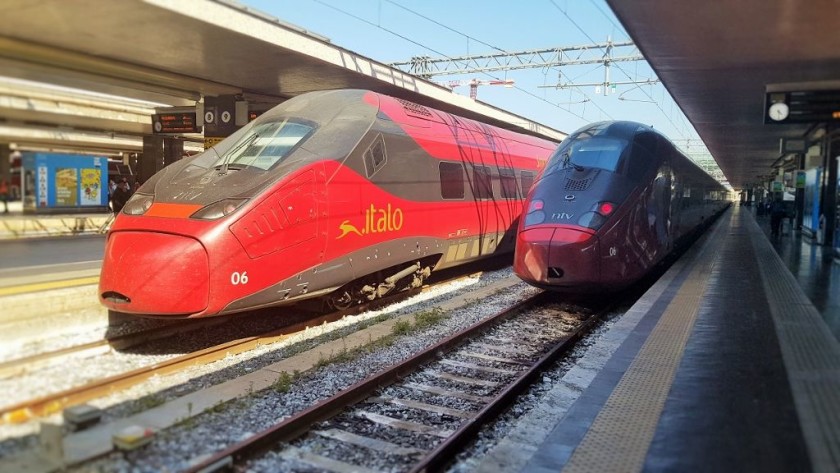
Eurail and Interrail and Trenitalia passes are NOT valid on Italo trains - the red trains pictured above, but Trenitalia services are available on all routes taken by Italo trains.
Some Regionale train services are operated by companies other than Trenitalia, but rail passes are valid on MOST of these - but not all.
Although they are valid on train services operated by Trenord - this company operates most train services in Lombardy, therefore many of the Regionale services to/from Milano are operated by Trenord
Italia in Tour Passes
ITALIA IN TOUR 3 and ITALIA IN TOUR 5 passes can be used for travel solely by the slower Regionale (R) and Regionale Veloce (RV) trains operated by Trenitalia.
They allow for unlimited travel by these trains for three or five consecutive days from the first day of travel and can be purchased on the Trenitalia website or from station ticket offices and Trenitalia ticket machines.
The passes can be used on the Leonardo Express, which connects Roma Termini station and the city's main airport, but they are not valid on:
- trains to/from stations in the Cinque Terre national park
- trains not operated by Trenitalia including those around Bolzano and on the route between Trento and Bassano del Grappa
- trains operated by Trenord, including the Malpensa Express services.
Note that Trenord is the dominant operator of R and RV services in and around Milan, so routes taken by these trains, on which the Italian Tour Passes cannot be used include trains between Milan and Bergamo, Brescia, Domodossola, Lecco, Stresa, Tirano and Verona.
Other Italian train travel info:
International trains on which reservations aren't needed:
On the international routes to/from Italy you can now only avoid rail pass reservation fees if you take local/regional trains across the border AND make connections to continue your journey; can be simpler than it seems and it can be a more scenic journey too.
The comparatively easy alternative journey options are:
(1) Take a Regionale (REG) and Regionale Veloce (RGV/RV) trains on the Verona - Trento - Bolzano - Brennero route.
Then at Brennero connect for the local trains on to Innsbruck
Do this and you can avoid the reservation fees charged on the EC trains between Italy and Austria/Germany.
(2) Take Regionale trains (branded TiLo) in either direction on the Milano - Como - Chiaso - Lugano - Locarno route.
Connect in Lugano for Swiss trains to/from Basel, Luzern and Zurich.
Do this and you can avoid the reservation fees charged on the EC trains between Italy and Switzerland.
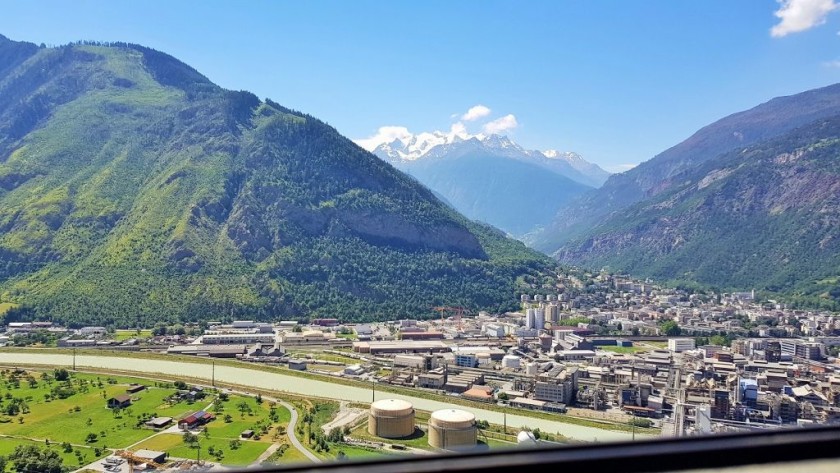
(3) Take Regionale trains between Milano and Domodossola.
Then at Domodossola you can connect into Centovali F.A.R.T trains for the stunning journey to Locarno in Switzerland; and then from Locarno you can travel on the spectacular route to Basel, Lugano, Luzern and Zurich.
Or connect in Domodossola for Swiss regional trains on to Brig and towards Bern; the route on to the Swiss capital is more spectacular than that taken by the EC trains.
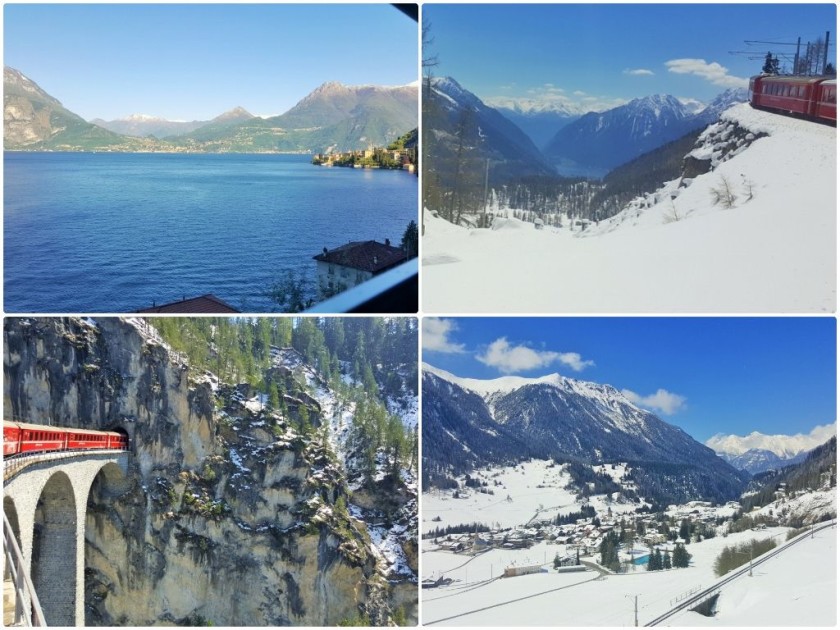
This is another option for avoiding the reservation fees charged on the EC trains between Italy and Switzerland.
(4) Take Regionale trains between Milano and Tirano.
At Tirano you can connect for RhB trains on to St Moritz - and with easy connections in Pontresina and Samedan, you can travel on to Chur
From Chur you can connect into trains on to Buchs (connect for Innsbruck and Salzburg); St Gallen and Zurich.
Do this and you can avoid the reservation fees charged on the EC trains between Italy and Switzerland - and you'll have a much more spectacular journey.
(5) Take the regional trains between Udine and Villach in Austria
Do this and you can avoid the the reservation fees now charged on the Railjet trains on the Venezia/Venice - Treviso - Udine <> Villach - Klagenfurt - Bruck an der Mur - Wien/Vienna route
These regional trains depart Udine at 07:14 (connection available from Treviso) and at 17:15 (connections available from Treviso, Trieste and Venezia)
Both trains have onward connections in Villach to Wien/Vienna via Klagenfurt.
International trains with mandatory reservations:
The EC trains to Austria, Slovenia and Switzerland
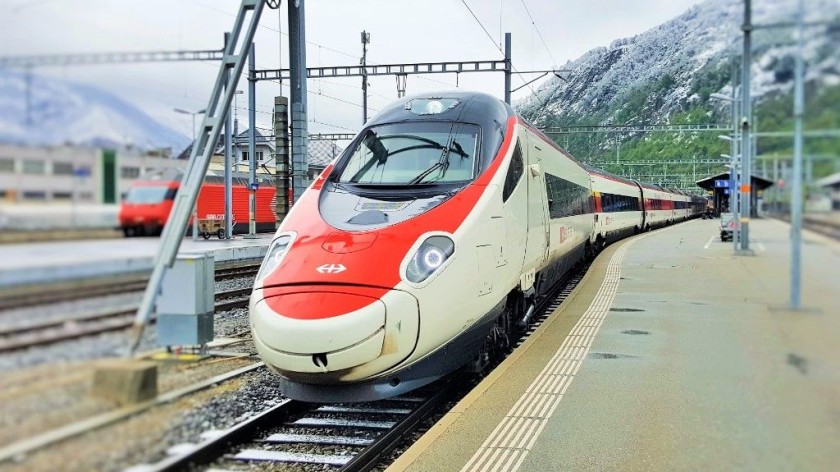
Italy ↔ Innsbruck - Kuftstein - Munich
Supplements are required on the EC trains (€15 in 1st and €10 in 2nd class) on the Bologna/Verona/Venezia - Bolzano - Brennero <> Innsbruck - Munchen/Munich route; Though now most departures on this route are by Railjets - see below.
The supplement can also be purchased from the conductor on board the train for an additional booking fee of €5 per person.
Though what is unusual is that these fees seemingly do not include seat reservations, which cost an extra €6* in both 1st and 2nd class.
*= The OBB online seat reservation service will charge €3 for the seat reservation.
Also note that the DB website can sell the seat reservations online, but not the supplement, but the OBB website will also sell the supplement,
So if you want to avoid paying the additional €5 fee on board, you will need to purchase the supplement in advance of boarding you need to purchase it from:
- the OBB website, or
- a Reisezentrum travel desk at a station in Austria or Germany
- a staffed ticket desk at station in Italy*
- the Eurail/Interrail reservation service*.
*= will also charge a €2 booking fee.
Or avoid paying these fees, by taking alternative journey options when travelling to Austria or Germany from Bologna, or from Venice/Venezia.
Italy ↔ Switzerland and Italy ↔ Ljubljana - Maribor - Graz - Vienna
Rail pass reservation fees are also mandatory on the EC trains between Italy and Switzerland (€13 in 1st and €11 in 2nd) and on the daily EC train on the Trieste <> Ljubljana - Maribor - Graz - Wien/Vienna route.
This guide to alternative routes shows how to avoid to these EC trains when travelling on multiple routes including from Milan to Basel, or to Geneva, or to Interlaken, or to Zurich.
The Railjets
Fees are now also charged for cross-border journeys (and for journeys within Italy) on the Railjet trains in either direction on these routes
- Venezia/Venice - Villach - Klagenfurt - Wien/Vienna
- Bologna / Venice / Verona - Bolzano - Innsbruck - Munchen.
If you have a multi country 'Global type of pass' the fees are €15 in 1st class and €10 in 2nd class, but if you only have a country pass valid in Austria or Italy the fees are €50 in 1st class and €30 in 2nd class.
If you book online by using the Eurail reservation service or the Interrail reservation service - you will be charged a €2 booking fee per reservation, per person.
However, SMTJ's understanding is that if you use these services you will also be assigned a seat reservation; but seat reservations are otherwise separate to the supplement on these Railjet services.
So if you pay the supplement at a Trenitalia ticket desk, you will also have to request a seat reservation at a cost of €3.50 as per the info on this page.
Also if you book a seat reservation on the OBB (Austrian Railways ) website - the instructions are here, the price you will initially see is the supplement, to which you also need to add the seat reservation.
Hence a guide to how to avoid paying these fees when travelling from Venice/Venezia to Wien/Vienna.
The Nightjet overnight trains
Reservations are also required for all the accommodation (seats/couchettes/sleeping cabins) on the Nightjet trains between Italy and both Austria and Germany
(There are no overnight trains between Italy and Switzerland)
TGV France-Italy trains*
SMTJ's advice is to avoid if possible the TGV France-Italy trains on the Milano - Torino - Chambery - (Lyon) - Paris route.
On these trains the reservation fees are slightly more expensive than the cheapest discounted tickets.
But if you can travel between Italy and France on this route at a weekend, and will be willing to changing trains, you can make savings when travelling from Milano or Torino/Turin to Lyon or Paris.
Booking these international train reservations:
Reservations for Eurail and Interrail pass users can't now be booked on the Trenitalia website and ItaliaRail doesn't sell rail pass reservations for international journeys to and from Italy.
If you want to book reservations prior to arriving in Italy for journeys from and to Italy on:
- the EC trains to/from Switzerland
- the EC trains to/from Austria and Germany
- the EC trains to/from Trieste on the Trieste <> Ljubljana - Maribor - Graz - Wien/Vienna route.
- the Railjet trains to/from Austria
- the Nightjet trains to/from Austria and Germany
they can be purchased without paying any additional fees, on the website of Austria's national rail operator, OBB.
Though the steps to take on the OBB website aren't particularly obvious, hence this guide* to booking Eurail/Interrail reservations with OBB.
The other option for booking reservations for these trains online is to use the Eurail reservation service or the Interrail reservation service but you will be charged a €2 booking fee per reservation.
Using these services is the only option for booking reservations on the TGV trains between Italy and France online.
Reservations for Eurail and Interrail users are not available on the Frecce trains which are now also used on the Milano - Torino - Lyon - Paris route.
Booking reservations when in Italy:
If you want to book reservations for the EC or Railjet trains* in Italy you have to use a ticket office, but no booking fees are charged.
*The ticket desks at Italian stations will not sell reservations for the TGV France - Italy services - they can be booked at a dedicated ticket desk in Milano Porta Garibaldi station.
Booking rail pass reservations for the night trains:
If you want to travel in a sleeping cabin or couchette on a Nightjet train to Austria or Germany it's best to book the reservation before arriving in Italy.
Couchettes and sleeping cabins can sell out on these trains weeks in advance.
Reservations will be available from 6 months ahead on the Nightjets.
OBB is the Austrian national rail operator and provider of the Nightjet network and it now enables rail pass users to book reservations online for journeys between both Austria and Italy - how to do this is explained here.
The reservation fees for the international express trains?
The fees on the popular routes include:
(1) Basel/Bern/Geneve/Luzern/Zurich – Milano (EC) = €13 in 1st and €11 in 2nd class
(2) Paris - Torino/Miano (TGV France/Italy) = €45 in 1st; €31 in 2nd
(3) Munchen - Innsbruck - Verona/Bologna/Venezia (EC) = €20.90 in 1st; €14.50 in 2nd - these fees also apply to journeys within Italy by these trains.
(4) Vienna/Wien - Klagenfurt - Villach - Udine - Venezia/Venice by Railjet = €15 in 1st and €10 in 2nd class
Note those eye watering rail pass fees for the TGV France/Italy trains; the discounted tickets for this service are cheaper than these reservation fees.
Please support ShowMeTheJourney
This second version of ShowMeTheJourney is exciting and new, so we are genuinely thrilled that you are here and reading this, but we also need your help.
We’re striving not to let anything get in the way of providing the most useful service possible, hence a facility has been set up with DonorBox which can be used to support the running costs and make improvements.
Instead of advertising or paywalls, your financial support will make a positive difference to delivering an enhanced service, as there’s a lot of ideas which we want to make happen.
So if you have found the info provided here to be useful, please go here to say thank you.
The other rail pass guides:
Other relevant travel guides:

Simon Harper
I wanted to share my passion for train travel and explain how anyone can take the fantastic journeys I have taken.

This is one of more than 100 train travel guides available on ShowMeTheJourney, which will make it easier to take the train journeys you want or need to make. As always, all images were captured on trips taken by ShowMeTheJourney.
This second version of ShowMeTheJourney is exciting and new, so we are genuinely thrilled that you are here and reading this, but we also need your help.
We’re striving not to let anything get in the way of providing the most useful service possible, hence a facility has been set up with DonorBox which can be used to support the running costs and make improvements.
Instead of advertising or paywalls, your financial support will make a positive difference to delivering an enhanced service, as there’s a lot of ideas which we want to make happen.
So if you have found the info provided here to be useful, please consider saying thank you.









